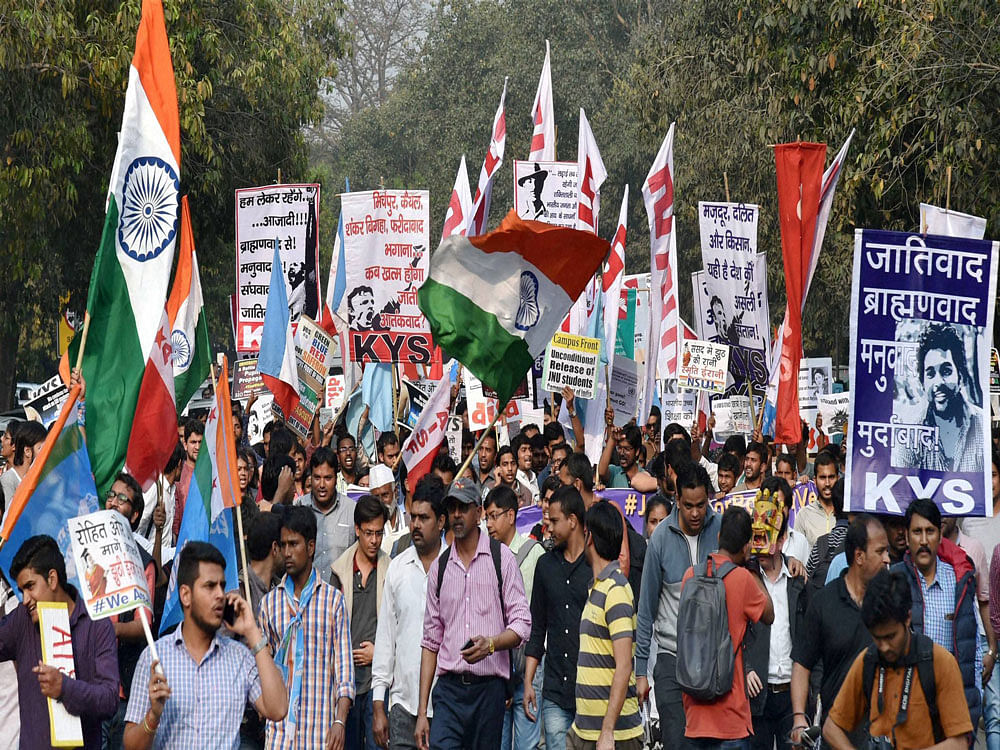Govt rejects proposed student politics banPlans study on overstaying of students, outsiders' entry
Last Updated IST

The proposed study would also seek to find ways to prevent non-students from staying in hostels and misusing facilities of the institute. File photo for representation purpose only.
The Human Resource Development (HRD) Ministry has rejected the T S R Subramanian committee’s recommendation banning student politics on university campuses.
In the revised draft of the new education policy, however, the ministry has proposed to conduct a study on how to prevent “outsiders” and those who have ceased to be students from playing an “active role” in student politics and disrupting the academic activities.
The proposed study would also seek to find ways to prevent non-students from staying in hostels and misusing facilities of the institute.
“The government recognises and will encourage the positive role played by student unions in furthering the interests of democracy and strengthening the democratic systems, governance and processes as well as debates, discussions and pluralism of thoughts,” the ministry said in the revised version of the draft policy.
However, it has been observed that most of the “disruptive activities” and disharmony on a campus are led by outsiders and students who remain enrolled for more years than what is mandated in the course of study they have enrolled in, it added.
The 43-page document, “Some Inputs for Draft National Education Policy 2016”, is in public domain. The ministry has invited people to share their “insights” on it.
The revised draft policy proposes a programme for pre-school education of children in the age group of four to five years in coordination with the Ministry of Women and Child Development. For this, the ministry proposes to take steps in consultation with states to frame curricula and develop learning materials, within a year and provide training to anganwadi workers.
No-detention policy will be amended to allow detention of students at primary school levels as it has “seriously” affected the academic performance. “The no-detention policy will be limited up to Class V. Academically weak students will be identified based on continuous and comprehensive evaluation conducted by schools for providing remedial instructions,” the ministry said.
In the revised draft of the new education policy, however, the ministry has proposed to conduct a study on how to prevent “outsiders” and those who have ceased to be students from playing an “active role” in student politics and disrupting the academic activities.
The proposed study would also seek to find ways to prevent non-students from staying in hostels and misusing facilities of the institute.
“The government recognises and will encourage the positive role played by student unions in furthering the interests of democracy and strengthening the democratic systems, governance and processes as well as debates, discussions and pluralism of thoughts,” the ministry said in the revised version of the draft policy.
However, it has been observed that most of the “disruptive activities” and disharmony on a campus are led by outsiders and students who remain enrolled for more years than what is mandated in the course of study they have enrolled in, it added.
The 43-page document, “Some Inputs for Draft National Education Policy 2016”, is in public domain. The ministry has invited people to share their “insights” on it.
The revised draft policy proposes a programme for pre-school education of children in the age group of four to five years in coordination with the Ministry of Women and Child Development. For this, the ministry proposes to take steps in consultation with states to frame curricula and develop learning materials, within a year and provide training to anganwadi workers.
No-detention policy will be amended to allow detention of students at primary school levels as it has “seriously” affected the academic performance. “The no-detention policy will be limited up to Class V. Academically weak students will be identified based on continuous and comprehensive evaluation conducted by schools for providing remedial instructions,” the ministry said.